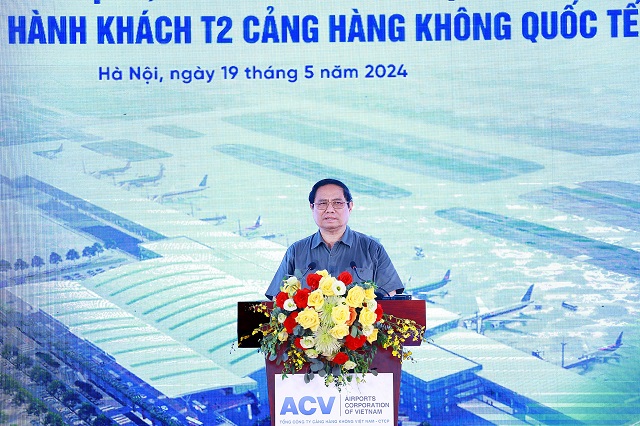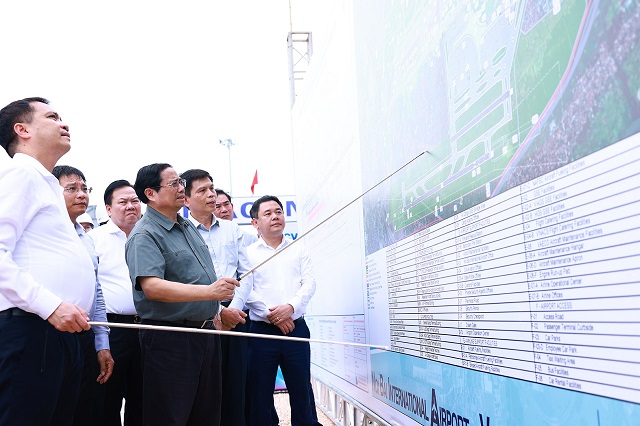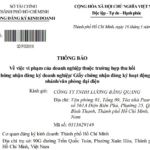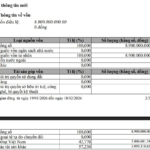
Prime Minister Pham Minh Chinh emphasized the urgency of expanding Terminal 2 at Noi Bai International Airport to address its current congestion, stating that it is a crucial and timely endeavor – Photo: VGP/Nhat Bac
|
During the event, Prime Minister Pham Minh Chinh highlighted that developing a synchronous and modern infrastructure system is one of the three strategic breakthroughs, given special attention and direction by the Party and the State.
Over the years, significant resources from the State, investors, and especially socialized capital have been allocated for transportation infrastructure development. Several vital transportation projects have been implemented, including numerous airport and airbase construction initiatives. Notable projects include the Long Thanh Airport and Tan Son Nhat Airport’s Terminal 3, which have been inaugurated (Dien Bien Airport, Phu Bai Airport…) and are currently under expansion and operation, such as Ca Mau Airport, Chu Lai Airport (Quang Nam), Phan Thiet Airport (Binh Thuan), and Thanh Son Airport (Ninh Thuan). The improvement of transportation infrastructure, including airports, plays a pivotal role in reducing logistics costs and fostering the country’s socio-economic development.
Given the nation’s development demands and integration, the Prime Minister noted that many airports in Vietnam have become congested, both in the air and on the ground, particularly at Tan Son Nhat and Noi Bai International Airports. He emphasized the necessity of having a plan and making investments that ensure uninterrupted high-quality operations and flight safety, both presently and in the future. In this regard, the construction of Tan Son Nhat Airport’s Terminal 3 commenced simultaneously with the Long Thanh International Airport terminal, and its inauguration is scheduled for August 31, 2023.

The Prime Minister pointed out that the expansion of Terminal 2, with its diverse and complex nature, necessitates a high standard of quality and synchronized construction – Photo: VGP/Nhat Bac
|
Noi Bai International Airport, the second busiest airport in the country in terms of passenger volume (serving nearly 30 million passengers in 2023) and the largest in terms of cargo volume (nearly 700,000 tons of cargo in 2023), is of paramount importance. It serves as the primary airport for specialized flights and receives the highest priority in the nation. Noi Bai International Airport holds a particularly strategic position in the development of Hanoi and the country, serving as the gateway to the capital city, hosting numerous international delegations and state leaders, and acting as a vital hub for trade and commerce. It is also a critical project concerning national security.
Prime Minister Pham Minh Chinh underscored the urgency of expanding Terminal 2 to address the current congestion at Noi Bai International Airport, stating that it is a crucial and timely endeavor. The expansion aims to increase the airport’s design capacity to 30 million passengers per year, with a potential to accommodate up to 40 million passengers annually. This will contribute to enhancing the quality of passenger services and the country’s competitiveness.
With a deadline of December 31, 2025, for project completion, the Prime Minister urged all stakeholders to draw on the successful experiences from other projects and embody the spirit of “only discussing how to do it, not whether to do it.” He emphasized the determination to “overcome the sun and win against the rain,” “eat quickly and sleep urgently,” work in “3 shifts and 4 teams,” and persist “through holidays and rest days.”
The Prime Minister instructed the Ministry of Transport, the Civil Aviation Authority of Vietnam, and the State Capital Management Committee to provide close direction to the investor and the Project Management Board in developing specific plans and coordinating throughout the project’s execution. This comprehensive approach will ensure absolute safety for flight operations at the airport and social order in the surrounding area.
The Vietnam Airports Corporation (ACV) was directed to guide the supervision consultants and contractors to adhere to the project’s objectives, ensuring timely and quality construction while efficiently utilizing the approved capital. They must also comply with the current regulations in construction and environmental protection.
The contractors were entrusted with the highest responsibility to uphold the law in construction strictly, mobilize sufficient machinery, equipment, and human resources, and promote the application of science and technology in the construction process. This commitment ensures quality, progress, technical and artistic standards, safety, and environmental sanitation. The use of substandard or insufficient materials or construction methods that do not meet the requirements and designs is strictly prohibited. The investor and supervision consultant will be held accountable if the contractors commit violations that affect the quality and progress of the project.
The Prime Minister emphasized that once the contractors have made their commitments, they must deliver effective and tangible outcomes, ensuring quality, compliance with regulations, and timely progress without waste or negativity. The construction process must be scientific and safe.
The Hanoi People’s Committee was instructed to continue providing close direction to the relevant departments, districts, and Soc Son district to coordinate, facilitate, and support the investor, contractors, and project implementation units to achieve the highest efficiency.
Under the direction of the State Capital Management Committee and the management of the Ministry of Transport, ACV was tasked with completing the overall planning for Noi Bai Airport with a breakthrough mindset and a strategic vision. While the investment may be phased, it should ensure a holistic approach, resulting in a “finished product.” The goal is to build a green, modern, and smart Noi Bai Airport that aligns with new trends.
|
Noi Bai Airport is currently one of the three largest international aviation gateways in the country. Terminal 2, with an area of approximately 139,000 m2 and a total investment of nearly VND 18,000 billion, has begun to experience congestion, as the number of passengers in 2019 reached 11.4 million, surpassing its initial design capacity of 10 million passengers by 2020. According to the Vietnam Airports Corporation (ACV – the investor), the expansion project of Terminal 2 at Noi Bai Airport will be built on an area of over 412,000 m2 (including the existing and expanded areas). The goal is to increase the total floor area of the terminal to 200,100 m2 and raise its capacity from 10 million passengers per year to 15 million passengers per year. This expansion involves increasing the number of check-in islands from 2 to 6, baggage claim carousels from 2 to 8, traditional check-in counters from 24 to a total of 120, self-check-in counters from 24 to 34, and kiosk check-in machines from 24 to 34. Additionally, the number of boarding bridges will be increased from 15 to 29, along with auxiliary works. The total investment for the project is VND 4,996 billion, and the main construction package is valued at VND 4,600 billion, fully funded by ACV. According to the contract, the construction is expected to be completed within 660 days (by February 2026). |












